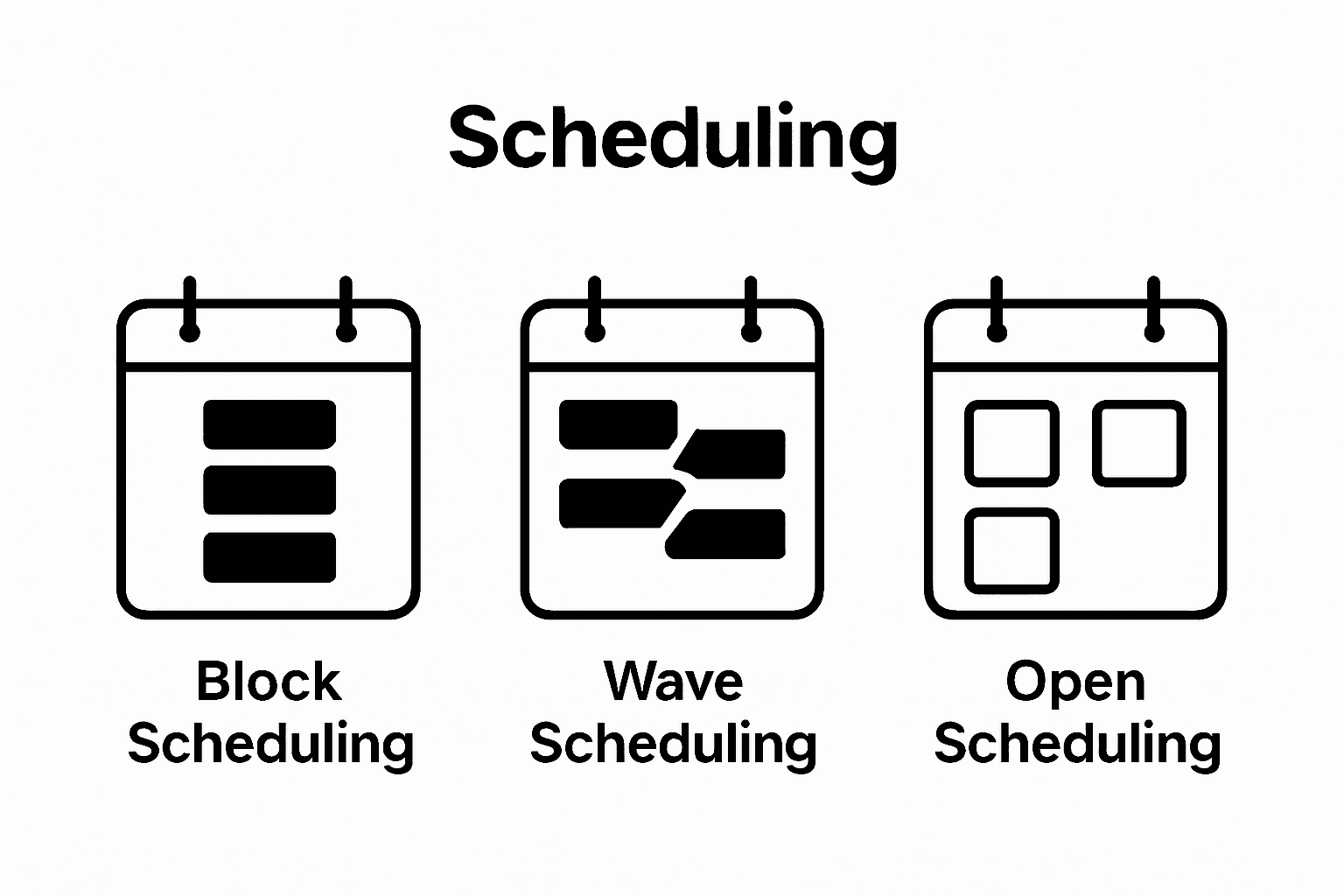Scheduling can make or break your workflow. Think about this. Inefficient scheduling is a leading cause of missed deadlines, wasted resources, and workplace stress, while optimized methods can raise productivity by up to 30 percent. Most people assume successful planners are just naturally organized. The real difference comes from a handful of smart scheduling principles anyone can use if they know where to look.
Table of Contents
- What Are Efficient Scheduling Methods And Why Do They Matter?
- Key Principles Of Efficient Scheduling Methods Explained
- Different Types Of Efficient Scheduling Methods In Practice
- The Impact Of Effective Scheduling On Event Success
- Real-World Examples Of Efficient Scheduling Methods
Quick Summary
| Takeaway | Explanation |
|---|---|
| Prioritize tasks effectively | Identify the most crucial tasks and their dependencies to maximize resource allocation and impact. |
| Adopt flexible scheduling methods | Use dynamic scheduling approaches to adjust plans in real time as conditions change. |
| Visualize workflows clearly | Create visual representations like Gantt charts to communicate task sequences and interdependencies. |
| Implement risk mitigation strategies | Develop contingency plans and alternative pathways to address potential scheduling vulnerabilities. |
| Engage stakeholders through transparent scheduling | Maintain clear communication and provide accessible timelines to foster collaboration and commitment among participants. |
What are Efficient Scheduling Methods and Why Do They Matter?
Efficient scheduling methods are systematic approaches designed to optimize task allocation, resource management, and time utilization across various planning scenarios. These strategic techniques help individuals and organizations transform chaotic planning into structured, predictable processes that maximize productivity and minimize wasted effort.
Understanding the Core Principles
At their foundation, efficient scheduling methods operate on several key principles. They aim to create a logical sequence of tasks, identify critical path dependencies, and allocate resources strategically. According to project management research, these methods enable planners to visualize complex workflows, anticipate potential bottlenecks, and create realistic timelines.
Key characteristics of efficient scheduling methods include:
- Prioritizing tasks based on importance and interdependencies
- Creating clear visual representations of workflow
- Allowing flexible adjustments as circumstances change
- Providing mechanisms for tracking progress
Why Scheduling Efficiency Matters
Ineffective scheduling can lead to significant challenges. Missed deadlines, resource conflicts, and unexpected delays can derail even the most well-intentioned plans. Efficient scheduling methods provide a structured framework that helps prevent these common pitfalls.
Professional environments demand precision. Whether managing complex project timelines, coordinating team activities, or planning personal goals, scheduling efficiency translates directly into tangible outcomes. By understanding and implementing robust scheduling techniques, you gain the ability to transform potential chaos into organized, predictable progress.
The ultimate goal of efficient scheduling is not just about tracking time but about creating strategic pathways that enable smoother, more productive workflows across personal and professional domains.
Key Principles of Efficient Scheduling Methods Explained
Efficient scheduling methods are built upon fundamental principles that transform complex planning challenges into manageable, strategic frameworks. These principles serve as a roadmap for converting potential chaos into organized, predictable progress across various professional and personal domains.
Task Prioritization and Sequencing
Task prioritization stands as a cornerstone of effective scheduling. According to project management research, successful scheduling requires understanding task dependencies, critical paths, and relative importance. This approach ensures resources are allocated where they generate maximum impact.
Critical aspects of task prioritization include:
- Identifying tasks with the highest strategic value
- Understanding interdependencies between different activities
- Recognizing potential bottlenecks before they emerge
- Creating flexible sequences that accommodate unexpected changes
Resource Allocation and Time Management
Resources are finite. Efficient scheduling methods recognize this fundamental constraint and develop strategies to optimize their use. This means not just assigning tasks, but carefully matching resource capabilities with specific requirements. Time becomes a strategic asset rather than a passive background element.
Successful resource allocation involves understanding three key dimensions:
- Individual skill sets and availability
- Equipment and technological constraints
- Potential time requirements for complex tasks
Dynamic Adaptability and Continuous Optimization
The most robust scheduling methods are not rigid structures but living, breathing frameworks that can adapt to changing circumstances. They incorporate mechanisms for real-time tracking, performance evaluation, and rapid recalibration. By maintaining flexibility, these methods ensure that planning remains responsive to emerging challenges and opportunities.
The ultimate goal of these principles is not mechanical task completion, but creating intelligent systems that transform planning from a administrative chore into a strategic advantage.
Below is a table summarizing the core principles of efficient scheduling methods and the specific focus of each, providing a clear overview for reference.
| Principle | What It Focuses On | How It Improves Scheduling |
|---|---|---|
| Task Prioritization & Sequencing | Identifying important tasks & dependencies | Ensures critical work happens first |
| Resource Allocation & Time Mgmt | Matching skills/resources to tasks | Reduces waste and idle time |
| Dynamic Adaptability | Real-time tracking and plan adjustment | Keeps plans relevant as things change |
| When implemented thoughtfully, efficient scheduling methods become powerful tools for turning vision into systematic, achievable results. |
Different Types of Efficient Scheduling Methods in Practice
Efficient scheduling methods are not one-size-fits-all solutions but rather a diverse toolkit of strategies tailored to specific organizational needs and contexts. Understanding the various approaches enables planners to select the most appropriate technique for their unique challenges.
Time-Based Scheduling Methods
Time-based scheduling methods focus on structuring activities around temporal constraints and availability. According to healthcare operations research, these methods range from traditional block scheduling to more dynamic approaches that maximize resource utilization.
**Key time-based scheduling approaches include:
 **
**
- Block scheduling: Allocating specific time blocks for predetermined activities
- Wave scheduling: Overlapping appointment times to reduce waiting periods
- Open scheduling: Allowing flexible time slots with minimal predetermined structure
Project-Oriented Scheduling Techniques
Project-oriented scheduling techniques are designed for complex, multiphase initiatives that require intricate coordination. These methods emphasize understanding task dependencies, critical paths, and potential bottlenecks before they impact overall project timelines.
Essential project scheduling methods comprise:
-
Critical Path Method (CPM): Identifying the sequence of most time-sensitive tasks
-
Program Evaluation and Review Technique (PERT): Analyzing task uncertainty and probabilistic timelines
-
Gantt Charts: Visualizing project stages and interdependencies graphically
Dynamic and Adaptive Scheduling Approaches
Modern scheduling methods increasingly incorporate flexibility and real-time adjustment capabilities. These approaches recognize that rigid planning often fails in complex, rapidly changing environments. Dynamic scheduling allows continuous monitoring and immediate recalibration of resources and timelines.
Adaptive scheduling characteristics include:
- Machine learning algorithms for predictive planning
- Real-time performance tracking
- Automated resource reallocation mechanisms
The evolution of scheduling methods reflects our growing understanding that effective planning is less about controlling every detail and more about creating intelligent, responsive systems that can navigate uncertainty with grace and precision.
To help clarify the value and distinctions between common scheduling methods, the following table compares the core types discussed in the article.
| Scheduling Method | Main Focus | Key Strength | Example Usage Scenario |
|---|---|---|---|
| Time-Based Scheduling | Structuring activities around time slots | Efficient resource utilization | Medical appointment scheduling |
| Project-Oriented Scheduling | Managing complex, multiphase initiatives | Visualizing dependencies and critical paths | Construction project planning |
| Dynamic/Adaptive Scheduling | Real-time adjustments to plan and resources | Responsive to change and uncertainty | Manufacturing workflow optimization |
The Impact of Effective Scheduling on Event Success
Scheduling transcends mere time management. It represents a strategic approach that can fundamentally transform event outcomes, turning potential chaos into orchestrated success. Understanding how scheduling influences event performance reveals its profound significance across multiple domains.
Resource Optimization and Coordination
Effective scheduling acts as a critical mechanism for aligning resources, participants, and objectives. According to public health research, well-structured scheduling directly correlates with improved project performance and reduced operational friction.
Key resource optimization strategies include:
- Precisely matching participant availability with event requirements
- Minimizing scheduling conflicts and overlaps
- Creating buffer zones for unexpected contingencies
- Ensuring equitable distribution of responsibilities
Stakeholder Engagement and Communication
A robust scheduling approach transforms event planning from a logistical challenge into a collaborative process. Transparent scheduling becomes a communication tool that aligns expectations, builds trust, and fosters collective commitment among participants.
Stakeholder engagement through effective scheduling involves:
- Providing clear, accessible timeline information
- Establishing predictable interaction patterns
- Creating opportunities for feedback and adjustment
- Maintaining consistent communication channels
Risk Mitigation and Contingency Planning
Comprehensive scheduling serves as a proactive risk management strategy. By anticipating potential disruptions and designing flexible frameworks, event organizers can respond swiftly to unexpected challenges. This approach transforms scheduling from a passive administrative task into an active problem-solving mechanism.
Risk mitigation through strategic scheduling means developing mechanisms that:
- Identify potential scheduling vulnerabilities
- Create alternative pathways for task completion
- Establish rapid response protocols
- Monitor and adjust in real-time
Ultimately, effective scheduling is not about rigid control but about creating intelligent, adaptive systems that transform complex planning challenges into seamless, successful experiences.
Real-World Examples of Efficient Scheduling Methods
Efficient scheduling methods extend far beyond theoretical concepts, demonstrating remarkable practical applications across diverse industries and scenarios. Real-world implementations showcase how strategic scheduling transforms complex challenges into manageable, optimized processes.
Manufacturing and Production Scheduling
Manufacturing environments demand precision and efficiency. According to advanced scheduling research, organizations increasingly adopt sophisticated scheduling algorithms that dynamically balance production requirements, resource constraints, and operational flexibility.
Key manufacturing scheduling strategies include:
- Job sequencing to minimize total production time
- Predictive maintenance scheduling
- Resource allocation across multiple production lines
- Real-time workflow optimization
Healthcare and Medical Service Coordination
Healthcare systems rely heavily on complex scheduling methods to manage patient care, staff allocation, and critical medical resources. Intelligent scheduling becomes a lifeline for hospitals and medical facilities, ensuring efficient patient treatment and optimal staff utilization.
Healthcare scheduling approaches involve:
- Appointment block management
- Emergency response time optimization
- Staff rotation and skill-based assignment
- Cross-departmental resource coordination
Academic and Educational Planning
Educational institutions demonstrate sophisticated scheduling techniques that balance multiple stakeholder needs. Complex timetabling requires considering classroom availability, faculty expertise, student preferences, and institutional constraints.
Advanced educational scheduling considerations include:
- Minimizing scheduling conflicts
- Balancing instructor workloads
- Maximizing classroom and resource utilization
- Creating flexible learning environments
These real-world examples illustrate that efficient scheduling is not a one-size-fits-all solution but a dynamic, adaptive approach that responds intelligently to unique organizational challenges.
 By understanding context, leveraging technology, and maintaining flexibility, scheduling becomes a powerful strategic tool for achieving operational excellence.
By understanding context, leveraging technology, and maintaining flexibility, scheduling becomes a powerful strategic tool for achieving operational excellence.
Transform Chaos into Clarity with WhenNOT’s Smart Scheduling
Tired of endless back-and-forth emails and juggling everyone’s busy schedules for your next group event? As highlighted in "Understanding Efficient Scheduling Methods for Better Planning," inefficient scheduling turns simple plans into complex headaches. Missed deadlines, wasted time, and uncertainty can quickly overwhelm even the most organized planners. If you want a tool that supports efficient, adaptable scheduling and avoids the common pitfalls featured in the article, WhenNOT is your game changer.

Take the guesswork out of group planning. With WhenNOT, you focus on when participants are not available—making it fast and easy to pinpoint the best dates. No sign-ups are needed and everyone’s privacy stays protected. Try WhenNOT today and experience the satisfaction of smooth, stress-free coordination. Start your next event or project now at WhenNOT’s homepage and feel the difference smarter scheduling makes.
Frequently Asked Questions
What are efficient scheduling methods?
Efficient scheduling methods are strategic approaches designed to optimize task allocation, resource management, and time utilization, transforming chaotic planning into structured processes that maximize productivity.
Why is scheduling efficiency important?
Scheduling efficiency is crucial as it helps prevent missed deadlines, resource conflicts, and unexpected delays, leading to smoother workflows and better project outcomes.
What are the core principles of efficient scheduling methods?
The core principles include task prioritization and sequencing, resource allocation and time management, and dynamic adaptability, ensuring a logical task flow while being responsive to changes.
What types of scheduling methods are commonly used in project management?
Common scheduling methods in project management include the Critical Path Method (CPM) for sequencing tasks, Program Evaluation and Review Technique (PERT) for analyzing uncertainty, and Gantt Charts for visualizing projects graphically.
